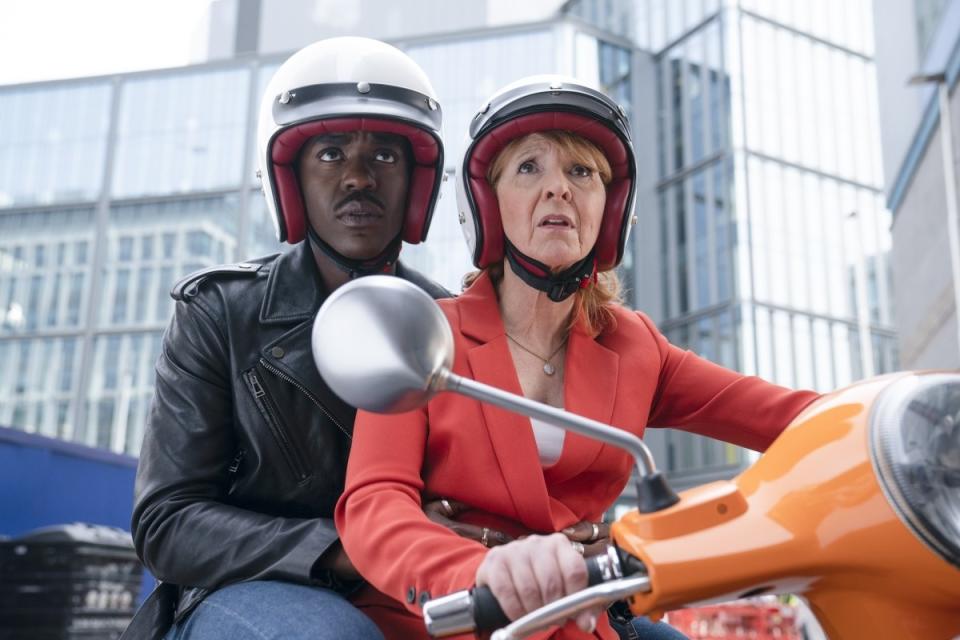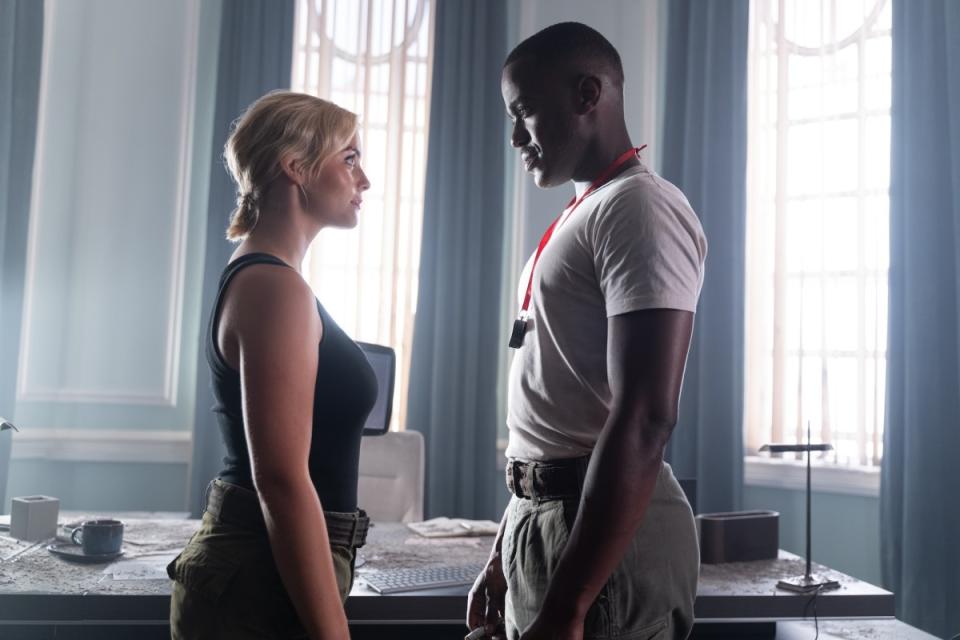Doctor Who: Empire of Death Review
- Oops!Something went wrong.Please try again later.
There are few finales in Doctor Who history that had this much hype going into them. This season has given us banger after banger and last week’s episode set everything up with an incredible cliffhanger. After something that will be remembered up there with the reveal of the Master in Utopia or the Doctor’s fake regeneration in The Stolen Earth, this episode had to hit the ground running, which it did for the first five minutes.
What I found strange is that after the opening action setpiece where everyone runs away from the sandstorm of death, the pace slowed down dramatically. This had its pros and cons. On the one hand, the episode felt like it stalled a bit after such an action-packed cliffhanger. I know it would be exhausting to keep up that pace for a full 50 minutes, but I could’ve done with the first half of the episode moving a bit quicker, or at least slowing things down more gradually.
On top of that, It runs into Doctor Who’s power-creep problem. If everyone we know dies and the whole Earth gets erased, it removes a degree of tension. We know how these kinds of stories work; when it’s all over every death will be undone, because how could the show go on otherwise?

BBC
That said, it is effective in another regard, and that’s isolating our heroes. Even though they often prove painfully helpless, UNIT’s existence is a comfort. There’s a reason fans get excited every time Kate reappears in the show. She and those under her bring warmth, as well as something for the Doctor to feed off, so ripping that away is disconcerting, even if we know it will be undone before the credits roll.
Plus, slowing things down allowed us to once again get an acting masterclass from Ncuti Gatwa, who has this supernatural ability to rip my heart in half. The way he gives Sutekh this triumphant “I will stop you” speech only for the facade to immediately drop once he’s away is everything I love about the Doctor. He stands tall and yells at the evils of the universe because he has to, but he still has to take the time to feel what’s inside.
The fact that he’s brought the god of death wherever he goes through time and space since his fourth of fifteen incarnations is great. Plus, the plot carefully explains why it’s taken all the way until now for Sutekh to reveal himself. He truly earns his nickname of “The one who waits”. As the Doctor processes that – conveniently standing in a literal room of memories – the weight of that fact crashes down on us and it makes his breakdown all the more impactful.

BBC
The dialogue in this scene is particularly praiseworthy. It sounds almost goofy to list years like 1999 and 2005, but if you’re a longtime fan, you know the importance those years have. We immediately cast our minds back to memories of episodes set in those years, along with the people and places that fill them; we know the Doctor is doing exactly that too, which makes it all the more painful to think about. Capping it off with this guttural scream into the void was the perfect exclamation to put on things.
Three paragraphs (now four) may seem like a lot to praise a three-minute scene, but it’s an encapsulation of one of the things I’ve loved so much about the writing this season. The emotional intelligence on display – while not the most complex I’ve ever seen in fiction – is the kind of thing even eras of the show I love have lacked. The Doctor is over two thousand years old, during which he’s never stopped having adventures. He contains more love, loss, joy, and pain than anyone in the universe, and over the last year we’ve finally stopped to take a look at what that would actually do to a person when it all catches up to them. 14 suppressed it to the point where it literally split him in half and now 15 understands how to accept it and make it a part of himself.
The tragedy of the situation is pushed further into perspective with such a simple scene of the Doctor visiting a survivor to ask for a basic favor. Plot-wise it appears pointless at first, but it’s so delightfully uncomfortable the way the universe is simply failing around us. This woman may have survived the initial wave of death, but it eats away at her and her memories. The simple fact that she can’t remember the name of the planet she’s on is enough to make it feel like a huge deal, let alone the final gut-punch of the scene when she realizes that she forgot her daughter was dead. Seeing how Sutekh has completely crushed the hope of just one ordinary person makes it feel more weighty than sweeping shots of decaying planets ever could.

Sutekh’s defeat was surprisingly sudden, but given how this episode chose to spend its time elsewhere I’m willing to accept it. It used elements that were carefully pre-established in the plot; some in this episode, others all the way back in the Christmas special. It took me a moment to get on board with the idea that “bringing death to death equals life”, but by this point, the episode had earned a leap in logic like that. It was certainly executed in spectacular fashion. The chaos of dragging the god of death through the time vortex came across, especially as it ripped a hole in the sky.
It’s also one of the few times this season where it was almost 100% the Doctor that saved the day, which is nice. He saw through Sutekh’s trick and used the one thing he desperately wanted – the identity of Ruby’s mother – to bait him into a trap. It’s not the cleverest solution he’s ever come up with, but it gave us a fun triumphant moment that the episode really needed after so much despair.
It also did something the Chibnall era so rarely remembered to do – remind us that killing should never be the answer. It’d be easy for the Doctor to heartlessly cast Sutekh off into the void. He is quite literally the god of death and it’s hard to get more evil than that. But no, RTD once again remembers exactly who this character is and what this show was about. The Doctor has to kill Sutekh because of course he does, but he doesn’t take pleasure in it like 13 often did, and he acknowledges that in some small way, Sutekh wins by turning the Doctor into a monster that has to resort to killing a god.

BBC
It reminds me a lot of the end of Last of the Time Lords. The Doctor saves the day, but he still loses on some level. Maybe not in a way that has any major consequences, but one that affects him as a person, throwing just a little bit more trauma onto his incomprehensibly large pile. What’s more, we don’t even get to linger on it long, as there’s one more question to be answered.
The ultimate twist is that there is no twist. For Ruby’s mother – a figure we have spent all season building to the reveal of – to be just a completely ordinary person is great. Doctor Who’s themes have always included the idea that someone the world views as “nobody” could become the most important person in the universe. It’s been used many times and I’ve always enjoyed that optimism.
The only problem I have is that the explanation of the lore surrounding it is a little too loose for my liking. I don’t necessarily have a problem with the idea that so many people treating her identity as a mystery paradoxically made it so, the problem is that there’s no explanation as to why. Was it just some indescribable cosmic force of the universe, to the point where she could hide from even a near-omnipotent being like Sutekh? Did the TARDIS’ involvement have something to do with it?

BBC
I honestly would’ve even been fine with the Doctor giving some vague “the universe works in mysterious ways” answer, but they don’t even go that far, which seems like a massive oversight for what is part of the key that saves the day. “She’s important because we think she’s important” is a nice concept with fun timey-wimey implications – and even another dig at religion while we’re at it – but there was no connection as to how that idea became tangible power.
Where an episode like 73 Yards thrived on the lack of answers – and sometimes less is more – this is a moment where things needed to be made clear, and it fell just a little bit short in that regard.
Ruby’s exit from the TARDIS was surprising, but I highly doubt this is the end of her story. There was confusion in the press earlier in the year with claims that Millie Gibson was leaving the show altogether after Season 1. However, Russell T Davies has outright denied that, so I think we’re doing something more interesting with the companion dynamic instead. Given what he’s said about Ruby’s story “spanning two years” and how season two has “some of the most magnificent scenes” for her, it seems like Ruby’s story might be continuing without the Doctor for a while.
My best guess would be that whoever Varada Sethu’s character ends up being next season will be the Doctor’s new full-time companion, while Ruby is left on a side-quest of some description, only connecting with the Doctor here and there until it all comes to a head. That is pure speculation of course, and who knows, maybe RTD was just lying to save spoilers (although I doubt that), but either way, it means there’s plenty to get excited about as we wait for this year’s Christmas special and 2025 season.

BBC
Speaking of, the wheels are already turning and I can feel the flames of fandom speculation being fanned as to Mrs Flood’s true identity. We got just enough to set people off into wild theorizing territory with her line about “having so many plans” and breaking the fourth wall right at the end to outright threaten the Doctor. This series proved that Davies knows how to guide the fanbase into exactly the kind of speculation he wants, so it’s going to be an exciting break between seasons. Is she the Master? The Rani? The Trickster? The Valeyard? I have no idea but I can’t wait to see all of the galaxy-brain takes on r/Gallifrey about it.
This was a worthy finale to what has been an absolutely incredible season of Doctor Who. While it did disappoint in a few small areas, I still came away from it feeling satisfied with the stories told, both on a short and long-term scale. After the Chibnall era ended it was a serious possibility that Doctor Who was on death’s door, but now it feels more full of life than ever.
Ncuti Gatwa is damn-near flawless in his portrayal of the Doctor, Millie Gibson as Ruby has been a delight to watch, and each story has brought something different to the table – in some cases, ideas that Doctor Who has never played with before – with all of them executed to near perfection. It leaves me incredibly excited for the season to come next year, for which filming has already finished and the hype is just beginning.

